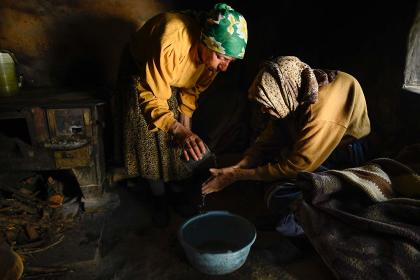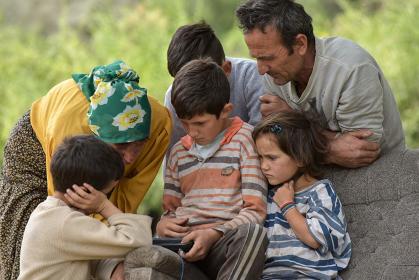Shortlisted Documentary ‘Honeyland’ Expresses A “Universal Message” With Macedonian Beekeeper Story

Click here to read the full article.
Documentaries that resonate deeply with audiences often do so on the strength of a compelling central character: the eccentric Little Edie from Grey Gardens, for instance, or the daring tightrope-walker Philippe Petit of Man on Wire, or the wrongly-convicted Randall Adams from The Thin Blue Line.
In Honeyland, one of 15 feature documentaries still in contention for the Academy Awards, the indelible main character is Hatidze Muratova, a woman from a remote section of North Macedonia. There she lives a humble existence cultivating honey from wild bees and tending to her very old and infirm mother in the rudimentary hut they call home.
More from Deadline
“Hatidze is a born star. We must say that. She really is,” filmmaker Tamara Kotevska observed at an event in March at New York’s Film Society of Lincoln Center. “She said, ‘This is my biggest dream, that some journalist come one day and shoot me while I was walking on the hills.’”

Over the course of three years, Kotevska and her fellow director Ljubomir Stefanov did much more than just film Hatidze crossing snowy fields and mountains, often in the company of her dog. They captured a whole manner of living that seems little altered since the Middle Ages. The filmmaking team came across Hatidze quite by chance, while working in a rural area on a project for a nature conservation group.
“It’s an abandoned territory… we spotted these holes in the rocks and assumed that they were actually honeycombs,” Stefanov recalls. “Soon after that we found the village of Bekirlija. We found Hatidze there with her mother and she accepted us at the first moment.”
They discovered important lessons in the way Hatidze cared for her bees; she made sure not to remove all the honey from the hive, which would have caused the colony to collapse.
“When she was taking the honey she was singing to the bees, ‘Half for you, half for me,’” notes cinematographer Samir Ljuma, “which she learned probably through her experience or she inherited from her parents, her ancestors, who were also beekeepers.”
“The point is to take as much as you need, not to take everything, and leave [something] for tomorrow and those who are providing for you. And it’s a universal message,” Stefanov says. Kotevska adds, “The best comparison would be with modern consumerism, because this is like a small world, like a microcosm that has the same rules as all this world about how consumerism destroys the natural resources completely.”
When a dirt-poor itinerant family in a caravan takes up residence next door to Hatidze, she demonstrates her generous heart by embracing their numerous children, becoming an empathetic presence in their lives. The father takes an interest in her beekeeping activities, sensing an economic opportunity; Hatidze tutors him in how to start a colony of his own, but warns him not to take all the honey from the hive because his bees would then attack and destroy hers. But under pressure from a buyer to come up with the most honey possible, the father ignores Hatidze’s injunction, with dire consequences for all.

“They’re not villains, because they need to survive,” Kotevska says of the itinerant family. “They’re 10 people in a deserted place and they must survive. The buyer [represents] the pressure of society put on them, like on each of us who everyday makes a choice what to buy from the store, what to do, what to eat and we’re all faced between the moral values and the pressures of society.”
Hatidze’s attention is divided between the neighbors, her beekeeping and the needs of her mother, who relies on her for everything, from nourishment to assistance with hygiene. The mother-daughter relationship can be read symbolically.
“When we were filming the scenes… how she was treating her mother, we find the same thing like with the bees—the mother was like the queen bee for the bee, which was Hatidze,” the DP Ljuma observes. “She was the one who was taking care of her mom like the bees are taking care of the queen bee.”
Filming Honeyland presented numerous challenges, given the rustic setting.
“Because we don’t have access to electricity, we were just there for three or four days in a row,” says Fejmi Daut, the other award-winning cinematographer on the documentary. “We brought food for those three or four days. We shared the food with Hatidze. We slept in the yard in front of the house in tents or on hammocks.”
Daut proved allergic to bees and Kotevska became a magnet for fleas. They also had to contend with furry, four-legged thieves.
“The biggest enemies during our stays were the cats because we didn’t have a place to store the food,” Ljuma remembers with a laugh. “Several times we ended up without food because cats will eat everything. They were just waiting for us to arrive to bring some food.”

Adopting Hatidze’s motto of “half for you, half for me,” the filmmakers have been looking out for their subjects.
“This is very important as a documentary filmmaker because we are [appearing on] these red carpets in festivals but our protagonist is still there,” comments editor and producer Atanas Georgiev. “So we bought a house for Hatidze in the nearest city, after her mother died. And we decided to raise a fund for the kids, a scholarship fund.”
The filmmaking team has set up a website where anyone can donate to help support the film’s characters. And benefactors get something in return—a sense of satisfaction, of course, and 30g of Honeyland’s finest honey.
Best of Deadline
Stan Lee's Legacy: Ranking The Hollywood Heroes Co-Created By The Marvel Comics Icon
Disney-Fox Deal: How It Ranks Among Biggest All-Time Media Mergers
Sign up for Deadline's Newsletter. For the latest news, follow us on Facebook, Twitter, and Instagram.

